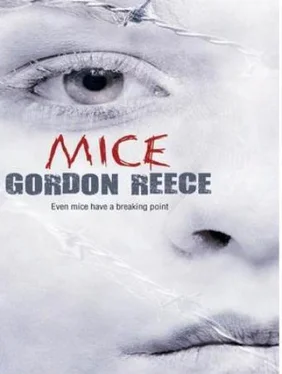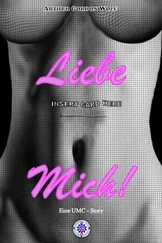Mum came stomping up the stairs when she heard my frantic shouts.
‘What is it?’ she cried, lurching into my bedroom, deathly pale and out of breath.
I didn’t say anything. I just pointed outside.
She gasped when she saw the car and swore under her breath. She stood behind me at the window, her hands on my shoulders, her chin resting on the crown of my head and I could feel her whole body trembling.
We went downstairs together in stunned silence and went through the motions of having breakfast in the dining room — neither of us was ready to return to the kitchen to eat. I tried to force down some toast, but Mum didn’t want anything. She just drank cup after cup of coffee. Black and very strong. She was horribly pasty, her bruised eye tinged a dirty yellow round its edges.
‘We mustn’t panic, Shelley. We’ve got to stay calm and think this thing through logically,’ she said. But I could see that she wasn’t finding it easy to stay calm herself — she chewed her bottom lip distractedly and dragged her hand through her hair over and over again.
‘We’ve got to think this through,’ she said, more to herself than to me, ‘we’ve got to think this through.’
‘What is there to think through?’ I cried in exasperation. ‘The burglar’s car is parked right outside our house — it’s going to draw the police to us like bees to a honey pot!’ I was overcome with a suffocating sense of panic. ‘It’s going to lead them right to us! I knew something like this would happen! I knew it! I knew it!’
‘Calm down, Shelley. Let me think. It might not be his car. It could belong to someone who broke down in the lane last night. It might have been abandoned by joyriders. We don’t know that it’s definitely his car.’
‘Oh, come on, Mum. It’s a bit of a coincidence, don’t you think? It’s parked right next to our house! That’s the corner of the garden he was heading towards when I — when I caught up with him.’
‘But we didn’t see it yesterday. Maybe it wasn’t there yesterday.’
‘Mum, we were too out of it to notice anything yesterday — and anyway, it can only be seen from my bedroom window and I hardly went in there all day yesterday.’
Mum sat in gloomy silence, seemingly set on trying to convince herself that the car wasn’t the burglar’s.
‘Mum, we’ve got to move it! We’ve got to get rid of it !’
She looked at me as if I’d gone mad. ‘Move it? How?’
‘Don’t you remember? There was a bunch of car keys in his pocket, they’re upstairs in one of the bin bags now. We’ve got to drive the car away from here — leave it somewhere. We’ve got to do it right now!’
‘We can’t do anything right now, Shelley. There isn’t time. I’ve got to get ready for work, and besides, it’s too dangerous in broad daylight — someone might see us.’
I wanted to scream at her, to get hold of her and shake her out of her complacency. ‘We can’t leave it another day, Mum — it’s blocking the road out there. Someone’s going to report it to the police. They’ll come here. They’ll start asking questions!’
‘We can’t do it now, Shelley. It’s too risky. We’ll have to wait for it to get dark.’
I began to protest, but Mum interrupted me. ‘I know it’s a risk to leave it another day, but it’s a risk we’re just going to have to take. And now I’ve got to go and get ready for work.’
She got up as if she bore the weight of the world on her shoulders. At the door she stopped and said resignedly, ‘Get the keys from the bin bag and — if it is his car — we’ll move it as soon as I get in from work. It should be dark by then.’
‘OK, Mum.’
‘And Shelley,’ she added over her shoulder, ‘don’t go near that car until I get home.’
The day passed in agony as I waited for Mum to finish work. I couldn’t concentrate at all. I just went through the motions in my class with Roger like an automaton — glancing at my watch every few minutes and wondering how time had managed to slow down, to congeal, to no more than an excruciating trickle. As we sat at the dining-room table revising glacial drift and French irregular verbs, all I could think about was the burglar’s car.
Right at that moment, some busybody neighbour might be ringing the police to report a badly parked car obstructing one of the lanes. The police would come out and look the car over. They’d thread their way back along the lane and turn up the drive into Honeysuckle Cottage. They were bound to. It was parked right next to our back garden. There were no other houses around. They’d knock authoritatively at the front door and ask me if the car belonged to anyone in my family or if I knew anything about it. What would I say to them then? Would I be able to speak to them without saying something to make them suspicious?
Later in the day, they’d tow the car away and we would have lost our chance for good. When Paul Hannigan was reported missing the police records would show that his car had been found right outside our house. Surely they’d be able to put two and two together? And it was possible the car might contain clues to make it even easier for them — our address written on a scrap of paper, a map with our cottage marked on it. If Paul Hannigan had previous convictions for burglary, it wouldn’t take a genius to work out that he’d come to Honeysuckle Cottage to rob it — and that he’d never been seen again.
The more I thought about it, the more anxious I became and the harder it was to concentrate. I felt Roger growing more and more irritated by my inattention and my incorrect answers, but he said nothing. When he’d finally gone, I raced upstairs to my bedroom to see if the car was still there and let out a squeal of relief when I glimpsed its turquoise roof through the roadside greenery. I spent the whole lunchtime up in my bedroom kneeling on my window seat, staring at the ugly car, thinking, thinking. .
I thought about Mum that morning and how she’d tried to convince herself it wasn’t the burglar’s car. I was tempted to go out there right then and try the car keys, so I could say to her when she came in that it definitely was the burglar’s car, so she’d stop clutching pathetically at straws. But I didn’t. I didn’t want to go against such a direct order from her. That would be like an open declaration of war.
In the hour or so that I sat up there, not a single car or tractor entered the lane, just a solitary cyclist in his skin-tight harlequin costume. He glanced at the car as he passed, but was more intent on getting something out of his back pocket with one hand as he steered the bike with the other.
Mrs Harris arrived with a birthday present for me — an expensive box of Belgian chocolates — but I hardly acknowledged it. While she droned on and on about prisms and the refraction of light, I had only one thought on my mind: We have to move the car, we have to move the car! I was convinced that if the police found it we’d be under arrest before the day was over. But if we were lucky, if it went unreported for just another few hours, and if Mum and I could safely get it away from the house without being seen, then we might have a chance, we might just have a chance.
The turquoise car was still there when Mrs Harris left. I stared at it from my bedroom window, drumming my fingers impatiently on the sill. Although it was only a quarter to five, I was pleased to see that the sky was already beginning to darken. In the west, long fingers of sunlight still pierced the banks of cloud here and there like theatrical spotlights, but over in the east black rain clouds were moving in fast, plunging the fields below them into premature night. It would be dark by seven.
A handful of rain suddenly spattered against the window, making me flinch. The dark rain clouds were spreading rapidly across the sky, extinguishing the luminous shafts one by one; the whole scene — the enormous sky divided almost equally between black and white reminded me of one of those nineteenth-century allegorical paintings with titles like The Clash Between Good and Evil .
Читать дальше












